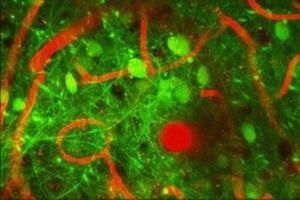 Functional Near-Infrared Spectroscopy (fNIRS) is the use of non-invasive near-infrared spectroscopy for the purpose of functional neuroimaging without the need for an MRI scanner. Using fNIRS, brain activity is measured through hemodynamic responses associated with neural activity. fNIRS is a non -invasive imaging method involving the quantification of chromophore concentration resolved from the measurement of near infrared (NIR) light attenuation, temporal or phasic changes. This is achieved through a cap studded with IR LEDs and IR photosensors, and can be worn in virtually all situations in which EEG data can also be collected, providing great flexibility in terms of use scenarios and the ability to combine with other sensor modalities, such as integration with EEG and in experimental settings and applications were conventional scanner-based neuroimaging may not be suitable, such as brain -machine interfaces, wheelchairs, or moving subjects. fNIRS is a recently developed Neurotechnology that has great potential in terms of applications, and proved early successes in Brain -Machine -Interfaces, neonatal neuroimaging and combination with EEG in many situations (e.g. motor control etc.) were neuroimaging is not suitable or not effective. The hemodynamic response characteristics of the fNIRS signal and much of its analysis techniques are matching those encountered in fMRI data.
Functional Near-Infrared Spectroscopy (fNIRS) is the use of non-invasive near-infrared spectroscopy for the purpose of functional neuroimaging without the need for an MRI scanner. Using fNIRS, brain activity is measured through hemodynamic responses associated with neural activity. fNIRS is a non -invasive imaging method involving the quantification of chromophore concentration resolved from the measurement of near infrared (NIR) light attenuation, temporal or phasic changes. This is achieved through a cap studded with IR LEDs and IR photosensors, and can be worn in virtually all situations in which EEG data can also be collected, providing great flexibility in terms of use scenarios and the ability to combine with other sensor modalities, such as integration with EEG and in experimental settings and applications were conventional scanner-based neuroimaging may not be suitable, such as brain -machine interfaces, wheelchairs, or moving subjects. fNIRS is a recently developed Neurotechnology that has great potential in terms of applications, and proved early successes in Brain -Machine -Interfaces, neonatal neuroimaging and combination with EEG in many situations (e.g. motor control etc.) were neuroimaging is not suitable or not effective. The hemodynamic response characteristics of the fNIRS signal and much of its analysis techniques are matching those encountered in fMRI data.
This equipment is available for use by any member of the Centre for Neurotechnology; for enquiries please get in touch with the contact listed below.
Location: Brain Behaviour Lab, RSM 4.19, South Kensington (but portable)
Contact: Aldo Faisal

Useful links
Funding support
We acknowledge the support of the EPSRC and Wellcome Trust in funding research facilities for the Centre for Neurotechnology.